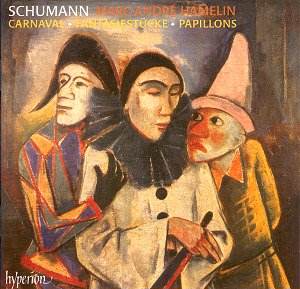Here is the second
instalment of Schumannís piano music
from Marc-André Hamelin and Hyperion.
I donít know if they intend to record
any more but itís certainly nice to
hear this super-virtuoso, so well known
for his championship of less well-known
figures, in some mainstream repertoire.
This puts him immediately into competition
with a host of familiar names, but Hamelin
is too interesting a musician ever to
ignore and there is plenty to enjoy
here.
In fact, itís fair
to say that Iíve got more and more out
of this disc on repeated listening.
Iíve found in the past that Hamelin
has occasionally displayed an Argerich-like
tendency to let his remarkable digital
dexterity run away with him, going for
breakneck speeds when they are not always
necessary. Not so here. Everything is
beautifully judged and Schumannís headily
Romantic mix of poetry, passion, invention
and virtuosity is realized to perfection.
The programme itself balances out very
well, with the cross-referencing of
Papillons and Carnaval
being offset by the darker magic of
the Fantasiestücke.
Papillons contains
some of the most capricious and diaphanous
music the composer ever wrote. Hamelinís
playing is both magisterial and mercurial,
with a touch of the mischievous thrown
in. The aptly grand, rhetorical gestures
of, say, track 3 are beautifully balanced
by the prestissimo fleetness
of track 10 and the nostalgic reminiscing
of track 12. He can also grade his tone
so that muscular fortes dissolve into
almost imperceptible whispers before
our ears.
Fantasiestücke
starts very slowly, but Hamelin maintains
tension and ultimately displays a masterly
control of ebb and flow, a difficult
balancing act in this music. He weaves
a chimerical magic here, capturing moods
that reflect the composerís delicate
inspiration. Warum? (track16)
has the feeling of dialogue, Hamelinís
musings achieving improvisatory freedom.
He points up the unexpected harmonic
shift in Ende vom Lied (track
21) which wistfully reflects the opening
and brings the work full circle.
Hamelin is able to
show his full range of keyboard skill
in Carnaval, Schumannís great
series of tableaux in which one character
after another takes centre-stage. Hamelin
is a big personality and is not afraid
to display it. The opening Préambule
is more imperious than Barenboim
(DG, a real bargain) and all the various
movements are by turns fervent, sparkling
and utterly convincing. I particularly
love Schumannís tribute to Chopin (track
33) where Hamelinís rubato makes me
long to hear him in this composerís
music.
Itís a well filled,
well planned disc thatís beautifully
recorded and annotated. Itís been in
the Ďcaní for some time now Ė indeed,
Carnaval was apparently tagged
on to spare recording time from the
sessions that formed Hamelinís first
disc. No matter, itís here now and can
be got online for less the ten pounds,
virtually mid-price. Yes, thereís competition
aplenty from Richter, Perahia, Argerich,
Lupu, Michelangeli etc in individual
works, but from what I can see of the
catalogue, Hyperionís programme is unique
and no-one who loves Schumann and acquires
this disc will be disappointed.
Tony Haywood


